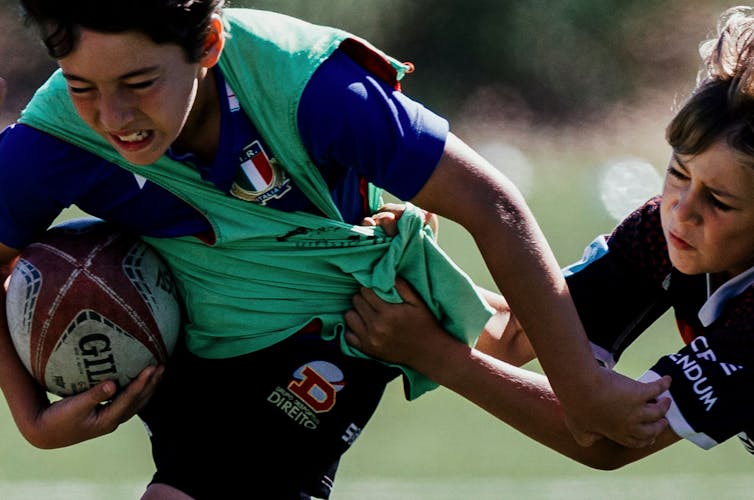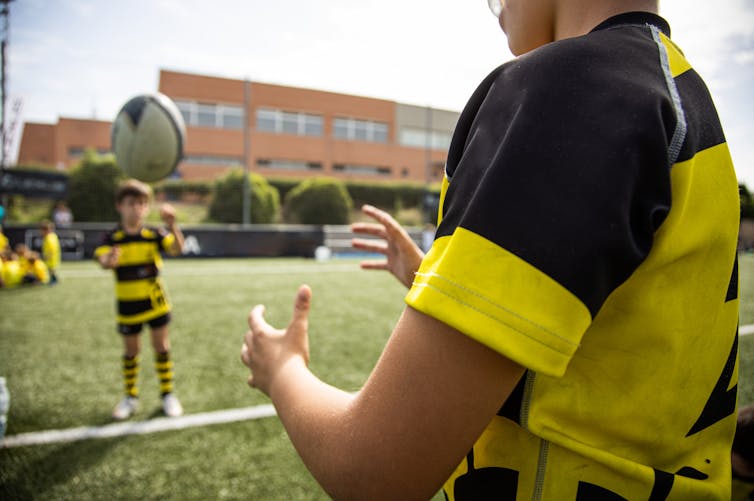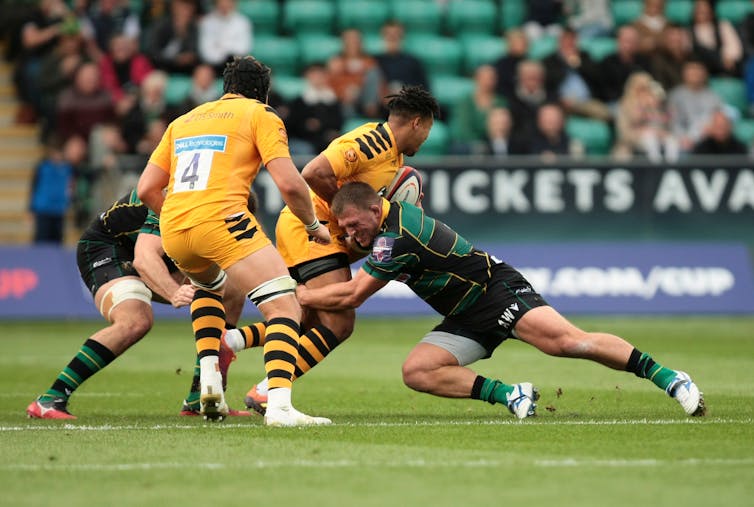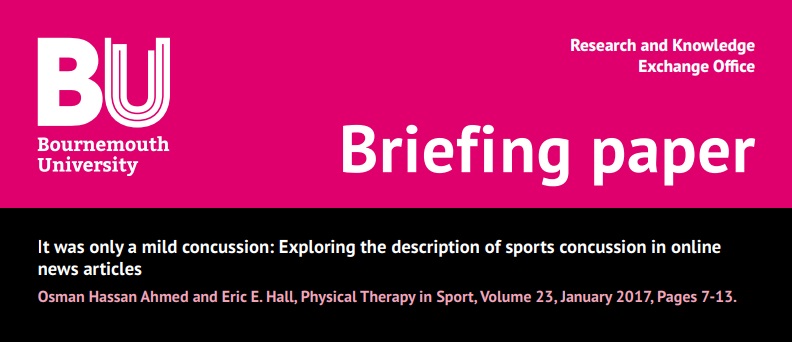Dr Keith Parry co-authors this article about new research which questions whether it is right for children to be involved in high impact sports that risk injury to the brain…
Children’s high-impact sports can be abuse – experts explain why

Eric Anderson, University of Winchester; Gary Turner, University of Winchester, and Keith Parry, Bournemouth University
Chronic traumatic encephalopathy (CTE) is a brain disorder likely caused by repeated head injuries. It was first described as dementia pugilistica and punch drunk syndrome almost 100 years ago. CTE continues to be a serious risk associated with high impact sports, such as boxing, American football and rugby.
Although the risks of traumatic brain injuries, such as concussion, and longer-term brain degeneration from repetitive hits in impact sports have been known for decades, some sport governing bodies continue to try and cast doubt onto the relationship between impact sports and CTE. However, media attention has begun to change people’s minds.
This growing awareness is accelerated by the many lawsuits against organising bodies in relation to brain trauma. Former professional and amateur players in sports such as American football, Australian rules football and rugby say their governing bodies failed to prevent harm during their playing careers.
The NFL has paid out almost a million pounds to former players suffering the effects of sport-induced brain trauma. High-profile rugby players are now also taking legal action over brain injuries.
These are not only issues for elite players. Studies into the brains of former players have found CTE in those who only played as amateurs. CTE has also been found in the brains of players under the age of 30 and even those as young as 17.
Each additional year of playing impact sports raises the risk of CTE, by as much as 30% in American football.
The dangers of high-impact sport aren’t contentious. Academic evidence and medical professionals now agree that sport-induced brain trauma leads to degenerative brain disease.
Not suitable for under-18s
Given this context, our recent paper written with Jack Hardwicke, a senior lecturer in the sociology of sport at Nottingham Trent University, has questioned whether it is right for children to participate in sports that intentionally feature impact, particularly involving the head. We argue that allowing under-18s to take part in high impact sports should be viewed as a form of child abuse – we use the term “child brain abuse” – and that these impact sports should be legally prohibited.
We are not calling for adult versions of impact sports to be banned and our argument does not apply to sports or activities where brain trauma might occur by accident. But in sports where impact is a structured part of the game, like boxing – or sports that create rapid brain movements, as in rugby tackling – collisions are not accidents, they are an inherent part of the sport.
Despite claims that sport is safer, there has been rightful concern over childhood concussions in these impact sports – and brain injury can occur at very low levels of impact. For example, heading a football can result in immediate and measurable alterations to brain functioning and longer-term brain diseases, such as CTE.
The risk of CTE is far higher in sports such as American football and rugby. The odds of developing degenerative brain diseases are increased in former players of impact sports than are found in sports without deliberate impacts or the general population.
Staying healthy
Some sports bodies defend high-impact sports by arguing that sport and physical activity are important for overall health. Teams sports can reduce isolation and help players to develop a range of social skills.
But these benefits can still be gained from non-impact versions of sports, such as touch rugby, which can help teach discipline and teamwork without the harm from brain trauma.
There are no health benefits of tackling – and there are no health benefits of being struck in the head. The health benefits of impact rugby or boxing are instead gained from the body’s overall movement.
Tag rugby tends to be faster moving than the sport’s full contact version so is better for improving cardiovascular health. Research has shown that incidents of contact during children’s rugby are the cause of cause of 87% of known injuries. Tackling, in particular, is responsible for 52% of all injuries – with concussion being the most common injury type. Tagging, rather than tackling, saves children’s brains from harm.
Inability to consent
Our research shows that impact sports should be treated equally with other prohibited activities for children, such as smoking. Children are unable to make informed decisions about the long-term risks of these activities. Parental provision for these activities is also socially stigmatised or criminalised.
Our research draws on a number of legal positions that support our argument that neither children nor parents on their behalf can consent to sports that require brain trauma as a necessary component of the sport.
For example, Article 19 of the United Nations Convention on the Rights of the Child (UNCRC), to which 195 countries are signatories, covers protection from violence, abuse and neglect. It states that:
Governments must do all they can to ensure that children are protected from all forms of violence, abuse, neglect and bad treatment by their parents or anyone else who looks after them.
Some commentators have agreed that while high-impact sports are dangerous, using the term child abuse is a step too far.
However, the NSPCC, the UK’s leading children’s charity, say that physical neglect is a form of abuse that occurs if a child is not kept safe. Allowing children to participate in impact sports while being aware of the harm they can cause is, our research shows, a failure keep children safe.
Opponents of prohibiting children from playing high-impact sports argue that boys are naturally aggressive and heavy contact sport helps them to learn how to control their feelings.
Boys, some argue, need physical activities – they need space and learn through activity. But there is no research showing that boys need to endure brain trauma in order to grow up to be responsible men.
There is no justifiable health reason for a child to play impact sport over non-impact versions. We are asking that ministers privilege children’s brains over corporate sporting bodies. ![]()
Eric Anderson, Professor of Masculinities, Sexualities and Sport, University of Winchester; Gary Turner, Doctoral researcher in Policy Analysis of Traumatic Brain Injury in UK Combat Sports, University of Winchester, and Keith Parry, Head Of Department in Department of Sport & Event Management, Bournemouth University
This article is republished from The Conversation under a Creative Commons license. Read the original article.


 Our
Our 










 REF Code of Practice consultation is open!
REF Code of Practice consultation is open! BU Leads AI-Driven Work Package in EU Horizon SUSHEAS Project
BU Leads AI-Driven Work Package in EU Horizon SUSHEAS Project Evidence Synthesis Centre open at Kathmandu University
Evidence Synthesis Centre open at Kathmandu University Expand Your Impact: Collaboration and Networking Workshops for Researchers
Expand Your Impact: Collaboration and Networking Workshops for Researchers ECR Funding Open Call: Research Culture & Community Grant – Apply now
ECR Funding Open Call: Research Culture & Community Grant – Apply now ECR Funding Open Call: Research Culture & Community Grant – Application Deadline Friday 12 December
ECR Funding Open Call: Research Culture & Community Grant – Application Deadline Friday 12 December MSCA Postdoctoral Fellowships 2025 Call
MSCA Postdoctoral Fellowships 2025 Call ERC Advanced Grant 2025 Webinar
ERC Advanced Grant 2025 Webinar Update on UKRO services
Update on UKRO services European research project exploring use of ‘virtual twins’ to better manage metabolic associated fatty liver disease
European research project exploring use of ‘virtual twins’ to better manage metabolic associated fatty liver disease